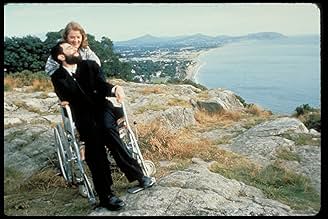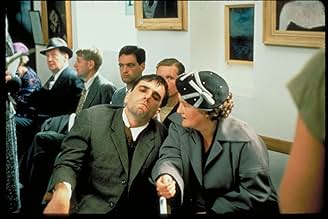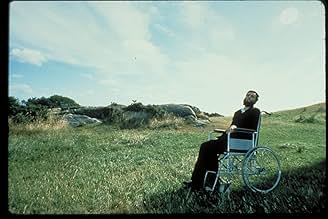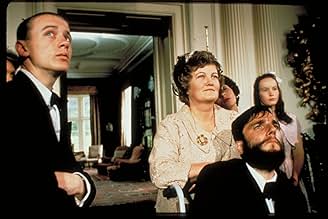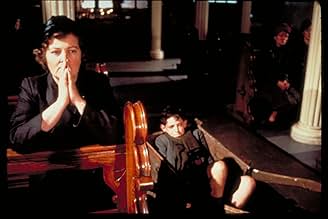Christy Brown, geboren mit zerebraler Lähmung, lernt mit seinem einzigen kontrollierbaren Glied - seinem linken Fuß - zu malen und zu schreiben.Christy Brown, geboren mit zerebraler Lähmung, lernt mit seinem einzigen kontrollierbaren Glied - seinem linken Fuß - zu malen und zu schreiben.Christy Brown, geboren mit zerebraler Lähmung, lernt mit seinem einzigen kontrollierbaren Glied - seinem linken Fuß - zu malen und zu schreiben.
- Regie
- Drehbuch
- Hauptbesetzung
- 2 Oscars gewonnen
- 23 Gewinne & 20 Nominierungen insgesamt
Pat Laffan
- Barman
- (as Patrick Laffan)
Owen Sharpe
- Young Tom
- (as Owen Sharp)
Empfohlene Bewertungen
Notable for marking the commencement of Daniel Day-Lewis' personal version of method acting, My Left Foot presents the widely acclaimed actor pushing himself to the extreme in what is undoubtedly one of the proudest works of his acting career. And even though the film doesn't have anything else to offer, the performances are strong enough to keep the viewers engaged.
Based on the autobiography of the same name, My Left Foot tells the story of Christy Brown; an Irishman who was born with cerebral palsy but despite his handicap went on to become an artist & writer, all with the help of the only thing he could fully control: his left foot. The film covers his upbringing in a poor family, his daily struggles, discovery of new passions & also his stint with love.
Wonderfully directed by Jim Sheridan, the film is heartwarming & heartbreaking at the same time, and is an inspiring insight into the life of Christy Brown that makes the viewers go through various emotions, but pity isn't one of them. The technical aspects are finely executed & have nothing special going on but it's in the performances where the film manages to make the most lasting impression.
There are three key performances that are worth noting here. First is Daniel Day-Lewis who delves into his character like never before & plays him from inside-out. Next is Brenda Fricker who strongly chips in as Christy's mother. And last we have Hugh O'Connor who is as good as Day-Lewis for his portrayal of young Christy Brown sets up a perfect stage for Day-Lewis to take over.
On an overall scale, My Left Foot is a touching tale about the indomitable will of the human spirit to triumph against all odds, and succeeds mainly because of the unforgettable performances from its highly committed cast. But even if the film is entirely dependent on its acting strength, it still makes up for a rich cinematic experience that comes as a must for Daniel Day-Lewis' admirers as well as critics.
Based on the autobiography of the same name, My Left Foot tells the story of Christy Brown; an Irishman who was born with cerebral palsy but despite his handicap went on to become an artist & writer, all with the help of the only thing he could fully control: his left foot. The film covers his upbringing in a poor family, his daily struggles, discovery of new passions & also his stint with love.
Wonderfully directed by Jim Sheridan, the film is heartwarming & heartbreaking at the same time, and is an inspiring insight into the life of Christy Brown that makes the viewers go through various emotions, but pity isn't one of them. The technical aspects are finely executed & have nothing special going on but it's in the performances where the film manages to make the most lasting impression.
There are three key performances that are worth noting here. First is Daniel Day-Lewis who delves into his character like never before & plays him from inside-out. Next is Brenda Fricker who strongly chips in as Christy's mother. And last we have Hugh O'Connor who is as good as Day-Lewis for his portrayal of young Christy Brown sets up a perfect stage for Day-Lewis to take over.
On an overall scale, My Left Foot is a touching tale about the indomitable will of the human spirit to triumph against all odds, and succeeds mainly because of the unforgettable performances from its highly committed cast. But even if the film is entirely dependent on its acting strength, it still makes up for a rich cinematic experience that comes as a must for Daniel Day-Lewis' admirers as well as critics.
A noted cinematic phenomenon of the late eighties and early nineties was the number of Oscars which went to actors playing characters who were either physically or mentally handicapped. The first was Marlee Matlin's award for "Children of a Lesser God" in 1986, and the next ten years were to see another "Best Actress" award (Holly Hunter for "The Piano" in 1994) and no fewer than five "Best Actor" awards (Dustin Hoffman in 1988 for "Rain Man", Daniel Day-Lewis in 1989 for "My Left Foot", Al Pacino in 1992 for "Scent of a Woman", Tom Hanks in 1994 for "Forrest Gump" and Geoffrey Rush in 1996 for "Shine") for portrayals of the disabled. Matlin, who played a deaf woman, is herself deaf, but all the others are able-bodied.
This phenomenon aroused some adverse comment at the time, with suggestions being made that these awards were given more for political correctness than for the quality of the acting. When Jodie Foster failed to win "Best Actress" for "Nell" in 1994 some people saw this as evidence of a backlash against this sort of portrayal. My view, however, is that the majority of these awards were well deserved. I thought the 1992 award should have gone to either Clint Eastwood or Robert Downey rather than Pacino, but apart from that the only one with which I disagreed would have been Hanks', and that was because I preferred Nigel Hawthorne's performance in "The Madness of King George". In that film, of course, Hawthorne played a character who was mentally ill.
"My Left Foot" was based upon the autobiography of the Irish writer and painter Christy Brown. Brown was born in 1931, one of the thirteen children of a working-class Dublin family. He was born with cerebral palsy and was at first wrongly thought to be mentally handicapped as well. He was for a long time incapable of deliberate movement or speech, but eventually discovered that he could control the movements of one part of his body, his left foot (hence the title). He learned to write and draw by holding a piece of chalk between his toes, and went on to become a painter and a published novelist and poet.
Life in working-class Dublin in the thirties and forties could be hard, and the city Jim Sheridan (himself a Dubliner) shows us here is in many ways a grim, grey, cheerless place, very different from our normal idea of the "Emerald Isle". (Sheridan and Day-Lewis were later to collaborate on another film with an Irish theme, "In the Name of the Father"). Against this, however, must be set the cheerfulness and spirit of its people, especially the Brown family. Much of Christy's success was due to the support he received from his parents, who refused to allow him to be institutionalised and always believed in the intelligence hidden beneath a crippled exterior, and from his siblings. We see how his brothers used to wheel him round in a specially-made cart and how they helped their bricklayer father to build Christy a room of his own in their back yard.
The film could easily have slid into sentimentality and ended up as just another heart-warming "triumph over adversity" movie. That it does not is due to a number of factors, principally the magnificent acting. In the course of his career, Day-Lewis has given a number of fine performances, but this, together with the recent "There Will Be Blood", is his best. He is never less than 100% convincing as Christie; his tortured, jerky movements and strained attempts at speech persuade us that we really are watching a disabled person, even though, intellectually, we are well aware that Day-Lewis is able-bodied. The other performances which stand out are from Fiona Shaw as his mentor Dr Eileen Cole, from Hugh O'Conor as the young Christy and from Brenda Fricker as Christy's mother (which won her the "Best Supporting Actress" award).
The other reason why the film escapes sentimentality is that it does not try to sentimentalise its main character. Christy Brown had a difficult life, but he could also be difficult to live with, and the film gives us a "warts and all" portrait. He was a heavy drinker, given to foul language and prone to outbursts of rage. He could also be selfish and manipulative of those around him, and the film shows us all these aspects of his character. Of course, it also shows us the positive aspects- his courage, his determination and his wicked sense of humour. Day-Lewis's acting is not just physically convincing, in that it persuades us to believe in his character's disability, but also emotionally and intellectually convincing, in that it brings out all these different facets of Christy's character. His Oscar was won in the teeth of some very strong opposition from the likes of Robin Williams and Kenneth Branagh, but it was well deserved. 8/10
This phenomenon aroused some adverse comment at the time, with suggestions being made that these awards were given more for political correctness than for the quality of the acting. When Jodie Foster failed to win "Best Actress" for "Nell" in 1994 some people saw this as evidence of a backlash against this sort of portrayal. My view, however, is that the majority of these awards were well deserved. I thought the 1992 award should have gone to either Clint Eastwood or Robert Downey rather than Pacino, but apart from that the only one with which I disagreed would have been Hanks', and that was because I preferred Nigel Hawthorne's performance in "The Madness of King George". In that film, of course, Hawthorne played a character who was mentally ill.
"My Left Foot" was based upon the autobiography of the Irish writer and painter Christy Brown. Brown was born in 1931, one of the thirteen children of a working-class Dublin family. He was born with cerebral palsy and was at first wrongly thought to be mentally handicapped as well. He was for a long time incapable of deliberate movement or speech, but eventually discovered that he could control the movements of one part of his body, his left foot (hence the title). He learned to write and draw by holding a piece of chalk between his toes, and went on to become a painter and a published novelist and poet.
Life in working-class Dublin in the thirties and forties could be hard, and the city Jim Sheridan (himself a Dubliner) shows us here is in many ways a grim, grey, cheerless place, very different from our normal idea of the "Emerald Isle". (Sheridan and Day-Lewis were later to collaborate on another film with an Irish theme, "In the Name of the Father"). Against this, however, must be set the cheerfulness and spirit of its people, especially the Brown family. Much of Christy's success was due to the support he received from his parents, who refused to allow him to be institutionalised and always believed in the intelligence hidden beneath a crippled exterior, and from his siblings. We see how his brothers used to wheel him round in a specially-made cart and how they helped their bricklayer father to build Christy a room of his own in their back yard.
The film could easily have slid into sentimentality and ended up as just another heart-warming "triumph over adversity" movie. That it does not is due to a number of factors, principally the magnificent acting. In the course of his career, Day-Lewis has given a number of fine performances, but this, together with the recent "There Will Be Blood", is his best. He is never less than 100% convincing as Christie; his tortured, jerky movements and strained attempts at speech persuade us that we really are watching a disabled person, even though, intellectually, we are well aware that Day-Lewis is able-bodied. The other performances which stand out are from Fiona Shaw as his mentor Dr Eileen Cole, from Hugh O'Conor as the young Christy and from Brenda Fricker as Christy's mother (which won her the "Best Supporting Actress" award).
The other reason why the film escapes sentimentality is that it does not try to sentimentalise its main character. Christy Brown had a difficult life, but he could also be difficult to live with, and the film gives us a "warts and all" portrait. He was a heavy drinker, given to foul language and prone to outbursts of rage. He could also be selfish and manipulative of those around him, and the film shows us all these aspects of his character. Of course, it also shows us the positive aspects- his courage, his determination and his wicked sense of humour. Day-Lewis's acting is not just physically convincing, in that it persuades us to believe in his character's disability, but also emotionally and intellectually convincing, in that it brings out all these different facets of Christy's character. His Oscar was won in the teeth of some very strong opposition from the likes of Robin Williams and Kenneth Branagh, but it was well deserved. 8/10
10llltdesq
Let me state at the outset that I have Cerebral Palsy and I went into this film expecting to have to make allowances for the lead performance. I left the theater half-convinced that they'd cast an actor who had Cerebral Palsy in the role, even though I knew that was not the case. The performances were generally excellent, with a special nod to Brenda Fricker and to Hugh O'Conner (I believe that's his name) as the young Christy Brown. Christy is talented, brash, arrogant, at times vulgar and petulant-in other words, human. This film, along with Gaby: A True Story and the documentary King Gimp, are excellent portrayals of life with CP. By no means a complete portrait, but fine examples of the disabled as human beings. Most highly recommended.
After watching The Left Foot, I have came to the conclusion that Daniel-Day Lewis the greatest actor alive and perhaps the greatest actor ever! But for the film itself, it's a powerful film that's well directed, well-acted, masterfully written, and provokes a good amount of emotion. But most of all, it spreads awareness about this handicap. Cerebral Palsy is something people should know about this and while not a propaganda piece, this film does a good job on giving the audience information about this disorder.
Jim Sheridan's film tells the biography of a man named Christy Brown. Born with cerebral palsy, the story goes from his tough childhood to his even tougher adulthood where he becomes an expert writer and painter despite the fact he only has mobility with his left foot.
Now on to Daniel Day-Lewis. I think people would agree with me on where I stand with him as an actor. He puts every ounce of effort into his roles and he acts as if he is actually the character he is portraying. After his roles in "In the Name of the Father", "Lincoln", "Gangs of New York", and "There Will Be Blood," I can honestly say he is the best actor ever. Also, I must single out Brenda Fricker in this role as Christy's mother because she does such an amazing job.
Overall, My Left Foot is a wonderful film that tells a story of a condition that many people must suffer through. I am glad there is a film that brings proper awareness to the condition and hence, much emotion is provoked. On technical terms, this film not the best since I felt it could use just a little better editing. But story-wise, yes it is perfect. I rate this film 9/10.
Jim Sheridan's film tells the biography of a man named Christy Brown. Born with cerebral palsy, the story goes from his tough childhood to his even tougher adulthood where he becomes an expert writer and painter despite the fact he only has mobility with his left foot.
Now on to Daniel Day-Lewis. I think people would agree with me on where I stand with him as an actor. He puts every ounce of effort into his roles and he acts as if he is actually the character he is portraying. After his roles in "In the Name of the Father", "Lincoln", "Gangs of New York", and "There Will Be Blood," I can honestly say he is the best actor ever. Also, I must single out Brenda Fricker in this role as Christy's mother because she does such an amazing job.
Overall, My Left Foot is a wonderful film that tells a story of a condition that many people must suffer through. I am glad there is a film that brings proper awareness to the condition and hence, much emotion is provoked. On technical terms, this film not the best since I felt it could use just a little better editing. But story-wise, yes it is perfect. I rate this film 9/10.
Daniel Day-Lewis' almost impossible performance as a man with cerebral palsy earned him a well-deserved Oscar in 1989 for Best Actor over the heavily favoured Tom Cruise in 'Born on the Fourth of July' and Morgan Freeman in 'Driving Miss Daisy'. The Academy was still riding the wave of awarding Dustin Hoffman a second Best Actor prize a year earlier for his performance as a mentally challenged individual in 'Rain Man' and since Day-Lewis' performance was superior to Hoffman's, the Academy had to recognize him. Day-Lewis probably would have won anyway as his performance was hard to ignore and he had never received any acting nominations from the Academy before this film despite turning in great work in such films as 'The Unbearable Lightness of Being' and 'My Beautiful Laundrette.'
As Christy Brown, Daniel Day-Lewis makes his character unsympathetic as he doesn't want you to feel sorry for him. He achieved the great success of being an accomplished writer and artist. Director Jim Sheridan directs the film like a series of home movies that millions want to see.
Brenda Fricker won the Oscar as Best Supporting Actress as Brown's mother and she is the real moral centre of the film and this film proves that Hollywood is capable of choosing small, lesser known films for Oscar consideration and 'My Left Foot' is a film that is uplifting without being sentimental.
As Christy Brown, Daniel Day-Lewis makes his character unsympathetic as he doesn't want you to feel sorry for him. He achieved the great success of being an accomplished writer and artist. Director Jim Sheridan directs the film like a series of home movies that millions want to see.
Brenda Fricker won the Oscar as Best Supporting Actress as Brown's mother and she is the real moral centre of the film and this film proves that Hollywood is capable of choosing small, lesser known films for Oscar consideration and 'My Left Foot' is a film that is uplifting without being sentimental.
Wusstest du schon
- WissenswertesAccording to the "Making of My Left Foot" segment on the Special Edition DVD, Sir Daniel Day-Lewis broke two ribs during filming from assuming the hunched-over position in his wheelchair for weeks of filming. He also would refuse to come out of character. On visits to the set canteen, other people would have to help him with food. On one visit from his English agent, Day-Lewis again refused to come out of character as Christy Brown, and his frustrated agent took off.
- PatzerIn the beginning of the movie, when Mary Carr gets Christy Brown into the library, the shadow of the boom mic can clearly be seen on a white door.
- Zitate
Christy Brown: I've had nothing but Platonic love all me life. Do you know what I say? FUCK PLATO! And fuck all love that's not a hundred percent commitment!
- SoundtracksFoggy Dew
(uncredited)
Traditional
Top-Auswahl
Melde dich zum Bewerten an und greife auf die Watchlist für personalisierte Empfehlungen zu.
- How long is My Left Foot?Powered by Alexa
Details
- Erscheinungsdatum
- Herkunftsländer
- Offizielle Standorte
- Sprache
- Auch bekannt als
- Mi pie izquierdo: la historia de Christy Brown
- Drehorte
- Produktionsfirmen
- Weitere beteiligte Unternehmen bei IMDbPro anzeigen
Box Office
- Budget
- 600.000 £ (geschätzt)
- Bruttoertrag in den USA und Kanada
- 14.743.391 $
- Eröffnungswochenende in den USA und in Kanada
- 41.165 $
- 12. Nov. 1989
- Weltweiter Bruttoertrag
- 14.743.391 $
Zu dieser Seite beitragen
Bearbeitung vorschlagen oder fehlenden Inhalt hinzufügen




